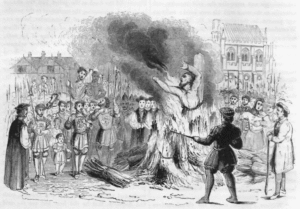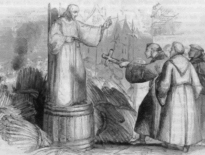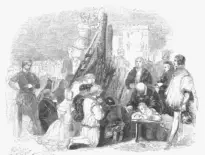 This week's #mondaymartyr is Protestant martyr William Flower (known also as Branch) who was burnt at the stake at St Margaret's Church in Westminster, London, on this day in Tudor history, 24th April 1555, in the reign of Queen Mary I.
This week's #mondaymartyr is Protestant martyr William Flower (known also as Branch) who was burnt at the stake at St Margaret's Church in Westminster, London, on this day in Tudor history, 24th April 1555, in the reign of Queen Mary I.
Merchant-tailor and citizen of London Henry Machyn recorded in his diary that Flower, who was a former monk from the abbey of Ely, was taken to Westminster "and had his hand stricken off" before being burnt at the stake that had been set up in the churchyard.
Machyn tells us that on Easter Sunday, 14th April that year, Flower had walked into St Margaret's Church while the people were receiving the blessed sacrament, and that he had asked the minister "what doyst thow gyff them?" before hitting the priest on the head with his "wod-knyffe", a cleaver, striking him a "grett blowe". He also struck him on the hand, cleaving his hand "a grett way" and then striking his arm, causing "a grett wond [wound]". Martyrologist John Foxeadds that the minister's blood flowed into the chalice containing the consecrated host as he'd been holding it when he was attacked.
Flower was apprehended and imprisoned before being examined by Edmund Bonner, Bishop of London. Flower had attacked the minister at St Margaret's because Flower had converted to Protestantism and rejected the doctrine of transubstantiation, i.e. that the bread and wine in the Eucharist change into the body and blood of Christ through the action of the Holy Spirit. Flower stated that his "extreme zeal" for his God led to his violent actions after he saw "the people falling down before a most shameful and detestable idol". He later stated that he "misliked" himself for doing what he did to the minister and that his act was evil and wicked. However, Flower stood firm in his Protestant faith.
Machyn records that Flower was arraigned at St Paul's on 20th April before Bonner, the Lord Chief Justice, the Lord Mayor and sheriffs, and many others. There, he was proclaimed a heretic and condemned to have the hand he used to attack the minister cut off before suffering death. He was then taken to Newgate to await his death.
John Foxe notes that Flower had his hand cut off for hurting the minister, but was "martyred for his constant standing to the truth".
John Foxe records William Flower's execution. It's not for the faint-hearted as Flower died a truly awful death:
Upon the twenty-fourth day of the aforesaid month of April, which was St. Mark's even, he was brought to the place of martyrdom, which was in St. Margaret's churchyard at Westminster, where the fact was committed: and there, coming to the stake where he should be burned, first he maketh his prayer to Almighty God, with a confession of his Christian faith, in manner as followeth:
O eternal God, most mighty and merciful Father, who hast sent down thy Son upon the earth, to save me and all mankind, who ascended up into heaven again, and left his blood upon the earth behind him, for the redemption of our sins, have mercy upon me, have mercy upon me, for thy dear Son our Saviour Jesus Christ's sake, in whom I confess only to be all salvation and justification, and that there is none other mean, nor way, nor holiness, in which or by which any man can be saved in this world.-- This is my faith, which I beseech all men here to bear witness of.
Then he said the Lord's prayer, and so made an end.
Then Master Cholmley came to him, willing him to recant his heresy, whereby he might do good to the people; or else he would be damned. Flower answered as followeth: "Sir, I beseech you, for God's sake, be contented; for that I have said, I have said: and I have been of this faith from the beginning; and I trust to the living God he will give me his Holy Spirit, to continue to the end." Then he desired all the world to forgive him whom he had offended, as he forgave all the world. This done, first his right hand, being held up against the stake, was stricken off, his left hand being stayed behind him. At the which striking off his hand, certain that were present beholders of the matter, and purposely observing the same, credibly informed us, that he in no part of his body did once shrink at the striking thereof, but once a little he stirred his shoulders.
And thus fire was set unto him, who burning therein, cried with a loud voice, "O the Son of God, have mercy upon me! O the Son of God, receive my soul!" three times; and so his speech being taken from him, he spake no more, lifting up, notwithstanding, his stump with his other arm, as long as he could. And thus endured this constant witness and faithful servant of God the extremity of the fire, being therein cruelly handled, by reason that to his burning little wood was brought; so that for lack of fa*gots, there being not sufficient to burn him, they were fain to strike him down into the fire; where he lying along (which was doleful to behold) upon the ground, his nether part was consumed in the fire, whilst his upper part was clean without the fire, his tongue in all men's sight still moving in his mouth.
Image: An illustration from Foxe's Book of Martyrs of the awful burning of William Flower
Sources
- Foxe, John, THE ACTS AND MONUMENTS OF THE CHRISTIAN CHURCH (Foxe's Book of Martyrs) - https://www.exclassics.com/foxe/foxe282.htm
- The Diary of Henry Machyn, Camden Society, p. 85 - https://archive.org/details/henrymachyncit00camduoft/page/84/mode/2up



Leave a Reply